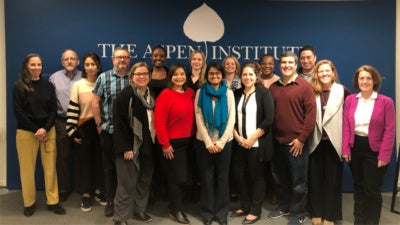We are pleased to bring you the latest edition of the Economic Opportunities Program’s newsletter! Learn how the Economic Opportunities Program (EOP) and its initiatives are driving change and helping low- and moderate-income Americans connect to and thrive in a changing economy.
Helping Businesses Calculate the Cost of Turnover
As the saying goes, what gets measured gets managed. High turnover can be a significant expense to businesses, but often goes unmeasured. But calculating this cost can reveal the value of investing in strategies to improve retention. The new Cost of Turnover Tool, developed by UpSkill America and Reimagine Retail, a project of the Workforce Strategies Initiative, is a simple, “back of the envelope” calculator that helps businesses estimate the financial impact of turnover. This tool can help businesses and workforce service providers start conversations about impacts of turnover that affect not only worker stability but also business operations and competitiveness.
Developing Local Workforce Leaders
Two new Workforce Leadership Academies kicked off this year, beginning a series of retreats and meetings for local leaders to work collaboratively to identify local and regional systems-based challenges, create shared solutions, and work with leading guest faculty practitioners from around the country. The Fellows of Chicagoland Workforce Leadership Academy, created in partnership with the Chicago Jobs Council, braved the polar vortex for their opening retreat, where they began exploring approaches to working with employers to improve job quality. The New Orleans Workforce Leadership Academy, a partnership with the New Orleans Business Alliance, held its opening retreat, beginning Fellows’ collaborative work to identify local and regional systems-based challenges and create shared solutions. In addition, the Toronto Sector Skills Academy, run in partnership with the Metcalf Foundation, graduated its second cohort of Fellows, who shared how the Academy influenced their work at a ceremony with community members.
Fostering Collaboration on Job Quality
Earlier this month, the second cohort of Job Quality Fellows met in Washington, DC, for three days of collaboration and learning. The Fellowship supports and strengthens the work of leaders dedicated to expanding access to and the availability of better quality jobs in our economy. Fellows worked together to share common challenges, learn from each other’s approaches, and develop opportunities for collaboration across their work. Fellows also had the opportunity to engage in conversation with leaders from organizations focused on small business finance, workforce development, employee ownership, worker advocacy, and more.
Understanding the Impacts of Unstable Scheduling
A recent study from the Center for WorkLife Law shows how unstable scheduling affects retail workers’ health, personal lives, finances, and even sleep. In a new blog post, Rachel Korn, the director of research at the center, shares key findings from the study and explains how stable scheduling can be an important strategy for businesses seeking to improve job quality, and one that can be a win-win for businesses and their workers.
Advancing Transparency in Small Business Lending
Last year, California passed a law that requires the first-ever truth-in-lending disclosure for small business financing in the US, based on the model created by the Small Business Borrowers’ Bill of Rights. FIELD Director Joyce Klein moderated a panel at the National Community Reinvestment Coalition’s Just Economy Conference on this experience, leading a conversation with colleagues from the Responsible Business Lending Coalition about their work with other advocates to support the passage of the bill and the lessons that others can use in their work.
Upcoming at EOP
Save the Date! We will be hosting a Working in America event on April 16 on how to ensure that Opportunity Zones support business ownership and quality jobs in local communities, with experts in policy, investment, and community development. Details and registration information will be coming soon.
Join the conversation
to join the conversation.
Tweet What’s new at EOP? Learn how the @AspenInstitute Economic Opportunities Program is helping people connect to and thrive in a changing economy.
About EOP
The Economic Opportunities Program (EOP) advances promising strategies, policies, and ideas to help low- and moderate-income Americans connect to and thrive in a changing economy. Over its 25 years of work, EOP has focused on expanding individuals’ opportunities to connect to quality work, to start businesses, and to build assets and economic stability. For more information, visit aspeninstitute.org/eop.
EOP has several initiatives, including the Workforce Strategies Initiative, FIELD, UpSkill America, and Good Companies/Good Jobs. Learn more about these initiatives by visiting their respective websites: aspeninstitute.org/wsi, aspeninstitute.org/field, aspeninsitute.org/gcgj, and aspeninstitute.org/upskill.
The Aspen Institute is an educational and policy studies organization based in Washington, DC. Its mission is to foster leadership based on enduring values and to provide a nonpartisan venue for dealing with critical issues. For more information, visit aspeninstitute.org.
Thank you to our many partners and funders for supporting our efforts.
Keep in touch
Click here to join our mailing list
or sign up below. For updates every day, follow us on social media.
What’s new at the Economic Opportunities Program, February 2019






